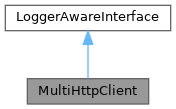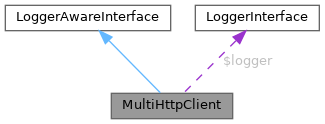Class to handle multiple HTTP requests. More...


Public Member Functions | |
| __construct (array $options) | |
| Since 1.35, callers should use HttpRequestFactory::createMultiClient() to get a client object with appropriately configured timeouts instead of constructing a MultiHttpClient directly. | |
| __destruct () | |
| run (array $req, array $opts=[]) | |
| Execute an HTTP(S) request. | |
| runMulti (array $reqs, array $opts=[]) | |
| Execute a set of HTTP(S) requests. | |
| setLogger (LoggerInterface $logger) | |
| Register a logger. | |
Protected Member Functions | |
| getCurlHandle (array &$req, array $opts) | |
| getCurlMulti (array $opts) | |
| isCurlEnabled () | |
| Determines if the curl extension is available. | |
Protected Attributes | |
| string null | $caBundlePath |
| SSL certificates path. | |
| resource object null | $cmh = null |
| @phpcs:ignore MediaWiki.Commenting.PropertyDocumentation.ObjectTypeHintVar curl_multi_init() handle, initialized in getCurlMulti() | |
| float | $connTimeout = 10 |
| string bool | $localProxy = false |
| string[] | $localVirtualHosts = [] |
| LoggerInterface | $logger |
| int | $maxConnsPerHost = 50 |
| float | $maxConnTimeout = INF |
| float | $maxReqTimeout = INF |
| string null | $proxy |
| proxy | |
| float | $reqTimeout = 30 |
| bool | $usePipelining = false |
| string | $userAgent = 'wikimedia/multi-http-client v1.0' |
Detailed Description
Class to handle multiple HTTP requests.
If curl is available, requests will be made concurrently. Otherwise, they will be made serially.
HTTP request maps are arrays that use the following format:
- method : GET/HEAD/PUT/POST/DELETE
- url : HTTP/HTTPS URL
- query : <query parameter field/value associative array> (uses RFC 3986)
- headers : <header name/value associative array>
- body : source to get the HTTP request body from; this can simply be a string (always), a resource for PUT requests, and a field/value array for POST request; array bodies are encoded as multipart/form-data and strings use application/x-www-form-urlencoded (headers sent automatically)
- stream : resource to stream the HTTP response body to
- proxy : HTTP proxy to use
- flags : map of boolean flags which supports:
- relayResponseHeaders : write out header via header() Request maps can use integer index 0 instead of 'method' and 1 instead of 'url'.
Since 1.35, callers should use HttpRequestFactory::createMultiClient() to get a client object with appropriately configured timeouts.
- Since
- 1.23
Definition at line 55 of file MultiHttpClient.php.
Constructor & Destructor Documentation
◆ __construct()
| MultiHttpClient::__construct | ( | array | $options | ) |
Since 1.35, callers should use HttpRequestFactory::createMultiClient() to get a client object with appropriately configured timeouts instead of constructing a MultiHttpClient directly.
- Parameters
-
array $options - connTimeout : default connection timeout (seconds)
- reqTimeout : default request timeout (seconds)
- maxConnTimeout : maximum connection timeout (seconds)
- maxReqTimeout : maximum request timeout (seconds)
- proxy : HTTP proxy to use
- localProxy : Reverse proxy to use for domains in localVirtualHosts
- localVirtualHosts : Domains that are configured as virtual hosts on the same machine
- usePipelining : whether to use HTTP pipelining if possible (for all hosts)
- maxConnsPerHost : maximum number of concurrent connections (per host)
- userAgent : The User-Agent header value to send
- logger : a \Psr\Log\LoggerInterface instance for debug logging
- caBundlePath : path to specific Certificate Authority bundle (if any)
- Exceptions
-
Exception
Definition at line 113 of file MultiHttpClient.php.
◆ __destruct()
| MultiHttpClient::__destruct | ( | ) |
Definition at line 785 of file MultiHttpClient.php.
Member Function Documentation
◆ getCurlHandle()
|
protected |
- Parameters
-
array &$req HTTP request map @phpcs:ignore Generic.Files.LineLength array $opts - connTimeout : default connection timeout
- reqTimeout : default request timeout
- httpVersion: default HTTP version @phpcs:ignore MediaWiki.Commenting.FunctionComment.ObjectTypeHintReturn
- Returns
- resource|object
- Exceptions
-
Exception
Definition at line 356 of file MultiHttpClient.php.
◆ getCurlMulti()
|
protected |
- Parameters
-
array $opts @phpcs:ignore MediaWiki.Commenting.FunctionComment.ObjectTypeHintReturn
- Returns
- resource|object
- Exceptions
-
Exception
Definition at line 489 of file MultiHttpClient.php.
References $cmh.
◆ isCurlEnabled()
|
protected |
Determines if the curl extension is available.
- Returns
- bool true if curl is available, false otherwise.
Definition at line 231 of file MultiHttpClient.php.
Referenced by runMulti().
◆ run()
| MultiHttpClient::run | ( | array | $req, |
| array | $opts = [] ) |
Execute an HTTP(S) request.
This method returns a response map of:
- code : HTTP response code or 0 if there was a serious error
- reason : HTTP response reason (empty if there was a serious error)
- headers : <header name/value associative array>
- body : HTTP response body or resource (if "stream" was set)
- error : Any error string The map also stores integer-indexed copies of these values. This lets callers do: list( $rcode, $rdesc, $rhdrs, $rbody, $rerr ) = $http->run( $req );
- Parameters
-
array $req HTTP request array array $opts
- connTimeout : connection timeout per request (seconds)
- reqTimeout : post-connection timeout per request (seconds)
- usePipelining : whether to use HTTP pipelining if possible (for all hosts)
- maxConnsPerHost : maximum number of concurrent connections (per host)
- httpVersion : One of 'v1.0', 'v1.1', 'v2' or 'v2.0'. Leave empty to use PHP/curl's default
- Returns
- array Response array for request
Definition at line 158 of file MultiHttpClient.php.
References runMulti().
◆ runMulti()
| MultiHttpClient::runMulti | ( | array | $reqs, |
| array | $opts = [] ) |
Execute a set of HTTP(S) requests.
If curl is available, requests will be made concurrently. Otherwise, they will be made serially.
The maps are returned by this method with the 'response' field set to a map of:
- code : HTTP response code or 0 if there was a serious error
- reason : HTTP response reason (empty if there was a serious error)
- headers : <header name/value associative array>
- body : HTTP response body or resource (if "stream" was set)
- error : Any error string The map also stores integer-indexed copies of these values. This lets callers do: All headers in the 'headers' field are normalized to use lower case names. This is true for the request headers and the response headers. Integer-indexed method/URL entries will also be changed to use the corresponding string keys.list( $rcode, $rdesc, $rhdrs, $rbody, $rerr ) = $req['response'];
- Parameters
-
array[] $reqs Map of HTTP request arrays array $opts Options - connTimeout : connection timeout per request (seconds)
- reqTimeout : post-connection timeout per request (seconds)
- usePipelining : whether to use HTTP pipelining if possible (for all hosts)
- maxConnsPerHost : maximum number of concurrent connections (per host)
- httpVersion : One of 'v1.0', 'v1.1', 'v2' or 'v2.0'. Leave empty to use PHP/curl's default
- Returns
- array[] $reqs With response array populated for each
- Exceptions
-
Exception
Definition at line 193 of file MultiHttpClient.php.
References isCurlEnabled().
Referenced by run().
◆ setLogger()
| MultiHttpClient::setLogger | ( | LoggerInterface | $logger | ) |
Register a logger.
- Parameters
-
LoggerInterface $logger
Definition at line 781 of file MultiHttpClient.php.
Member Data Documentation
◆ $caBundlePath
|
protected |
SSL certificates path.
Definition at line 64 of file MultiHttpClient.php.
◆ $cmh
|
protected |
@phpcs:ignore MediaWiki.Commenting.PropertyDocumentation.ObjectTypeHintVar curl_multi_init() handle, initialized in getCurlMulti()
Definition at line 62 of file MultiHttpClient.php.
Referenced by getCurlMulti().
◆ $connTimeout
|
protected |
Definition at line 66 of file MultiHttpClient.php.
◆ $localProxy
|
protected |
Definition at line 80 of file MultiHttpClient.php.
◆ $localVirtualHosts
|
protected |
Definition at line 82 of file MultiHttpClient.php.
◆ $logger
|
protected |
Definition at line 86 of file MultiHttpClient.php.
◆ $maxConnsPerHost
|
protected |
Definition at line 76 of file MultiHttpClient.php.
◆ $maxConnTimeout
|
protected |
Definition at line 68 of file MultiHttpClient.php.
◆ $maxReqTimeout
|
protected |
Definition at line 72 of file MultiHttpClient.php.
◆ $proxy
|
protected |
proxy
Definition at line 78 of file MultiHttpClient.php.
◆ $reqTimeout
|
protected |
Definition at line 70 of file MultiHttpClient.php.
◆ $usePipelining
|
protected |
Definition at line 74 of file MultiHttpClient.php.
◆ $userAgent
|
protected |
Definition at line 84 of file MultiHttpClient.php.
The documentation for this class was generated from the following file:
- includes/libs/http/MultiHttpClient.php